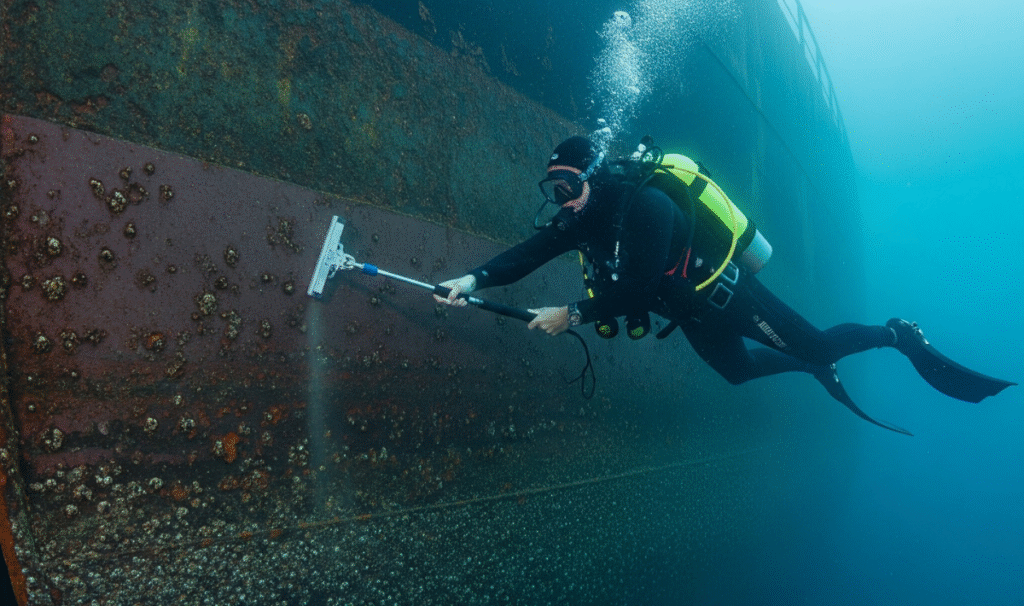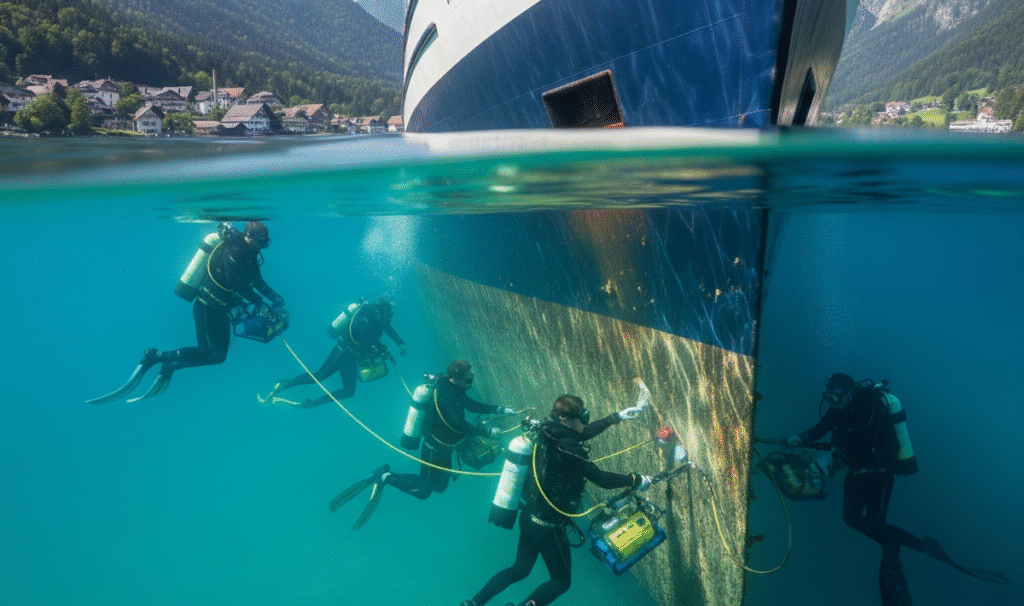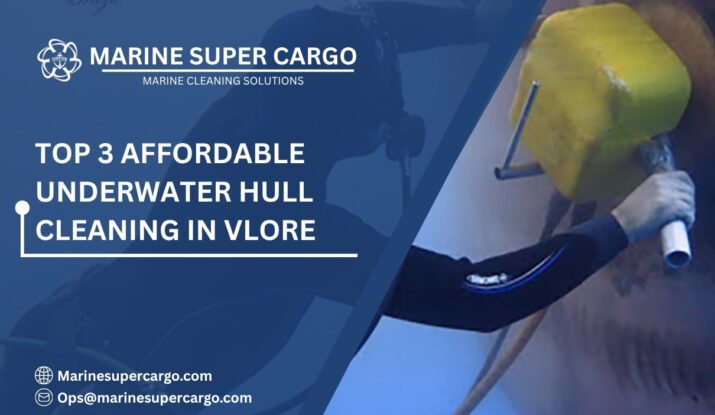Running a ship is like managing a finely tuned orchestra—every part must play in harmony for smooth sailing. Yet, one unsung hero often hidden from view is the hull. Below the waterline, marine growth silently attaches to your vessel, slowing it down, wasting fuel, and draining profits. That’s where underwater hull cleaning in Vlore comes into play.
In this guide, we’ll uncover why regular hull cleaning in the Port of Vlore is critical, how the process works, the rules you need to follow, the environmental and financial benefits, as well as the future of this vital maintenance practice. Whether you’re a ship owner, operator, or manager, this is knowledge that directly impacts your fleet’s efficiency and compliance.
Why Hull Cleaning is Crucial in Vlore
Vlore, a key Albanian port on the Adriatic Sea, has seen a surge in maritime traffic in recent years. Cargo ships, tankers, fishing fleets, and ferries all move through its waters daily. With such heavy marine traffic, the conditions for biofouling—when marine organisms attach to hulls—are almost perfect. Without preventive measures, ships quickly lose their edge.
Scheduling underwater hull cleaning in Vlore keeps your ships running like sprinters rather than joggers weighed down with backpacks. Simply put, it ensures efficiency, saves money, and helps protect the marine environment.
Understanding Hull Fouling
If you’ve ever left a garden hose outside and noticed it covered in green algae after a few days, you already understand hull fouling. Only in this case, it’s not your hose—it’s your multimillion-dollar vessel.
There are two main categories:
- Soft Fouling – includes slime, biofilm, and algae.
- Hard Fouling – includes barnacles, shells, and mussels that cling stubbornly to the hull.
Both types increase drag, meaning your engines must work harder, leading to higher fuel use and greenhouse gas emissions. Regular underwater hull cleaning in Vlore removes this buildup, restoring ship speed and efficiency.

How Underwater Hull Cleaning Works
Inspection First
Before diving in, a professional team inspects the hull using divers or remotely operated vehicles (ROVs). The goal is to identify the extent and type of fouling.
Cleaning Techniques
Once assessed, various methods are applied:
- Rotary Brushes to clear slime and algae.
- Scrapers for hard surfaces encrusted with barnacles.
- ROV Systems for cleaning hard-to-reach or deeper areas efficiently.
Final Checks
After the job, divers or robotic cameras verify the cleaning to ensure the protective coatings remain intact. Done properly, underwater hull cleaning in Vlore is thorough, efficient, and minimally disruptive to ship operations.
Compliance With International Regulations
Today, hull cleaning isn’t just about performance—it’s about staying compliant. Organizations such as the International Maritime Organization (IMO) emphasize reducing invasive species spread through hull fouling. Similarly, the MARPOL Convention (Annex VI) targets emissions reduction, of which clean hulls play a vital role.
By investing in underwater hull cleaning in Vlore, you’re aligning with:
- IMO’s Biofouling Guidelines.
- MARPOL efficiency requirements.
- Regional environmental policies protecting the Adriatic marine ecosystem.
- Port authority procedures ensuring safe practices in Vlore.
Reference frameworks from IMO, IMCA, and IAPH give reliable guidance for fleet compliance.
The Environmental Case for Hull Cleaning
We often think of shipping as leaving only an atmospheric footprint, but fouled hulls tell another story. They act as transporters for invasive species, which can upend ecosystems and fisheries. On top of that, the drag caused by fouling means burning more fuel, which directly increases emissions.
With regular underwater hull cleaning in Vlore, ships:
- Reduce fuel consumption, thereby lowering CO₂ and other harmful emissions.
- Prevent unwanted marine species from traveling across oceans.
- Support global sustainability initiatives without relying on chemicals or dry-docking.
In short, clean hulls help both your business and the environment breathe easier.
Cost Savings of Regular Hull Cleaning
Every ship operator knows the numbers. Fuel is one of the highest operating expenses. Fouled hulls can increase consumption by 20–30%. That translates into tens of thousands of extra dollars per voyage.
Here’s where underwater hull cleaning in Vlore pays for itself:
- Fuel savings from reduced drag.
- Lower long-term maintenance costs.
- Extended lifespan of costly anti-fouling hull coatings.
- Reduced risk of costly non-compliance fines.
A clean hull is like having a stronger tailwind—it makes every journey swifter and cheaper.
Innovations in Underwater Hull Cleaning
Hull cleaning is no longer limited to divers with brushes—it’s becoming a high-tech field.
Cutting-Edge Tools and Techniques
- Robotic Cleaning Units – harnessing precision technology for continuous operations.
- AI-Based Monitoring Systems – predicting fouling before it impacts performance.
- Eco-Friendly Cleaning Pads – designed to remove growth gently, protecting coatings.
Such innovations are reshaping underwater hull cleaning in Vlore, making the process faster, safer, and greener for ship operators.
Risks and Key Considerations
While cleaning is vital, improper methods can cause harm. Over-aggressive scrubbing may strip protective coatings or release fouling debris into surrounding waters. This makes professional standards essential.
When scheduling underwater hull cleaning in Vlore, ship managers should ensure:
- Services follow IMCA diver safety guidelines.
- Waste is collected responsibly.
- Equipment minimizes abrasion to hull coatings.
The goal is efficiency, not damage—so working with certified providers is always the best move.

Similar market advantages are discussed in underwater hull cleaning in Albania.
Best Practices for Ship Operators
For those managing fleets in Vlore, here are the recommended steps:
- Maintain a hull maintenance logbook for each vessel.
- Clean propellers along with the hull for maximum energy efficiency.
- Schedule inspections regularly, adjusting based on voyage routes and seasonal fouling rates.
- Partner with internationally certified cleaning service providers.
These practices make underwater hull cleaning in Vlore both predictable and profitable.
The Future of Hull Cleaning in Vlore
The future will see hull cleaning become even smarter and greener. With stricter emission targets, rising fuel costs, and stronger sustainability requirements, regular hull cleaning is set to be a must-have rather than an optional expense.
Expect to see:
- Fully autonomous robotic cleaning is the standard method.
- Integrated IoT systems providing live hull condition updates.
- Global regulatory frameworks are pushing for proactive cleaning measures.
This means that for ships calling Vlore, underwater hull cleaning in Vlore will be a vital long-term strategy—future-proofing both compliance and efficiency.
Conclusion
Operating through the Adriatic means staying competitive, compliant, and sustainable. Underwater hull cleaning in Vlore gives you all three advantages: saving fuel, reducing emissions, protecting ecosystems, and meeting global regulations. Beyond cost savings, it’s about being a responsible steward of the seas while keeping your fleet efficient and future-ready.
As a ship owner or manager, choosing regular hull cleanings with trusted partners like CleanShip.co is not just about short-term efficiency—it’s an investment in longer voyages, healthier oceans, and stronger bottom lines.
FAQ:
Q1. How often should ships get underwater hull cleaning in Vlore?
Typically, every 3–6 months, depending on vessel type, operating routes, and fouling conditions.
Q2. Is underwater hull cleaning in Vlore environmentally safe?
Yes, when done by certified teams using eco-friendly methods, it helps reduce emissions and invasive species transfer.
Q3. Can hull cleaning damage my vessel’s protective coatings?
Not when done properly. Certified cleaners use equipment designed to protect coatings while removing fouling.
Q4. What’s the main financial benefit of underwater hull cleaning in Vlore?
Fuel savings are the biggest benefit, often paying back the cost of cleaning many times over.
Q5. Are robotic systems widely available for hull cleaning in Vlore?
They are emerging rapidly, offering faster, safer, and more sustainable alternatives to traditional diver-led cleaning.


